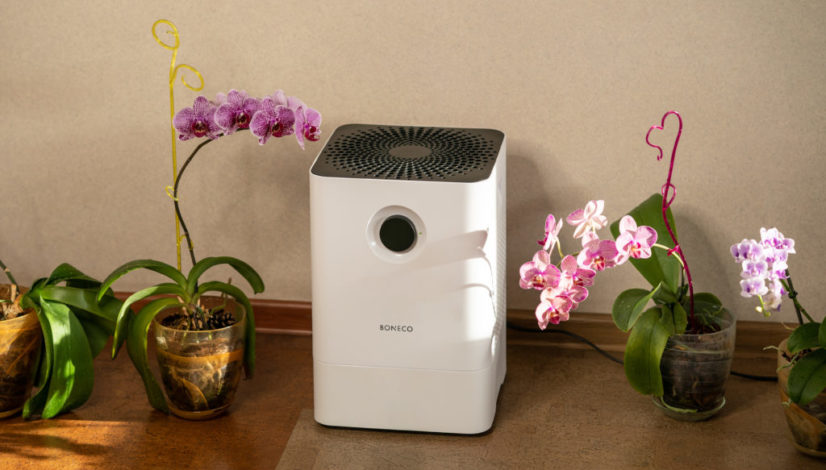Humidifiers
What are humidifiers for?
When the weather gets cold and we turn on the heat inside to stay warm, the air can become excessively dry, especially when the building has an electric heating system. The dry air seeks out what humidity there is inside. If the only sources of humidity are your skin, throat or nose, then the dry air will dry them, increasing your chances of contracting a cold or the flu.
This is where humidifiers come in handy. Humidifiers are devices designed to humidify the surrounding air. Regular preventive use of a humidifier keeps air humidity at a healthy level, preventing unnecessary dryness of the respiratory tract. At home, the relative humidity should be below 50% in summer and 30% in winter.
Use a humidifier when you have a respiratory tract infection (e.g., colds, flu, bronchitis, and pneumonia). It will help you get better. A respiratory tract infection often makes breathing difficult because of the secretions that build up in the lungs and sinuses. A humidifier softens and liquefies the secretions, making them easier to eliminate. Also using a humidifier when you are asleep helps provide your system with water while you rest.
Are there many types of humidifiers?
YES. There are 3 types: warm mist, cool mist, and ultrasonic humidifiers.
Which type of humidifier should you use?
There is no easy answer. Each humidifier has advantages and disadvantages. Warm mist humidifiers heat water, killing microorganisms and yeast, and they release warm germ-free moisture into the room. These humidifiers tend to require less cleaning than cool mist models. These humidifiers, however, can burn people if they come in contact with the hot water. Avoid skin contact with the warm mist and keep this type of humidifier out of reach of children.
Water in cool mist humidifiers has to be changed daily to prevent the growth of microorganisms (which would then be released in the air). These humidifiers are safer than warm mist types because they cannot cause burns.
Ultrasonic humidifiers are much more expensive than the other two types, but they are quieter and allow humidity level to be preset.
What kind of water should I put in my humidifier?
Ideally, only distilled water should be used, because it contains no minerals. When minerals are released in the air, people can breathe them and have an increased risk of contracting an infection… In addition, tap water, especially in ultrasonic humidifiers, will produce a white dust that can deposit on furniture. To prevent this, newer models all use a demineralizing cartridge or filter that needs to be changed on a regular basis to maintain efficacy.
What about medicinal solutions?
Medicine cups, designed to contain over-the-counter medicinal solutions, are found only on warm mist humidifiers. These solutions contain products that irritate the respiratory tract and only give the impression of being decongestants. In reality, they do not relieve congestion, and should not be used.
Should you use bleach to clean your humidifier?
NO. Even though bleach effectively kills bacteria, its use to clean humidifiers is not recommended because it is very irritating and can induce an allergic reaction. In addition, it releases an unpleasant odor. Instead, only use products specifically designed to clean humidifiers.
Visit in person to our Burnaby Medicine Shoppe location, or visit https://medicineshoppeonline.com for your pharmacy services, including home support, prescription transfers, Rx refills, and telemedicine. Our website also offers up-to-date health resources. Shop online for compression socks , atoma branded products, and other home support products. Call us at 604-229-8353 to request a free consultation.
© Copyright Vigilance Santé
The patient information leaflets are provided by Vigilance Santé Inc. This content is for information purposes only and does not in any manner whatsoever replace the opinion or advice of your health care professional. Always consult a health care professional before making a decision about your medication or treatment.




